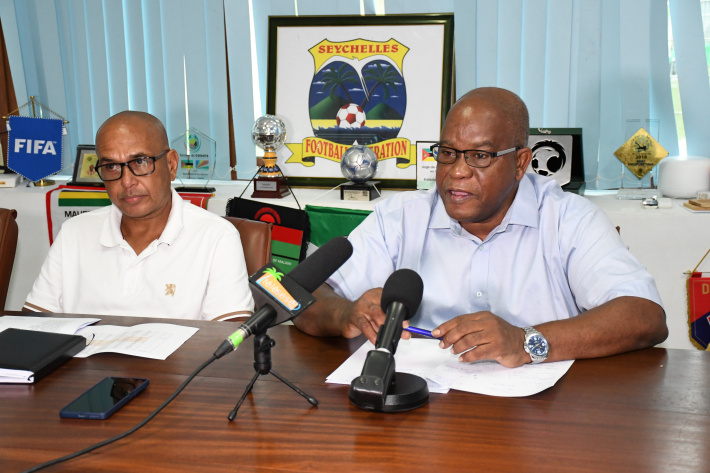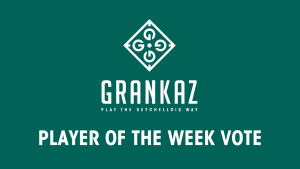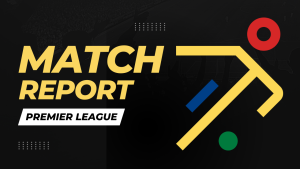
As the Seychelles national selection adds in the final touches to its preparations prior to one of, if not the biggest match in the country’s football history, lead coach Ralph Jean-Louis has voiced several concerns, mainly in terms of lack of cooperation and understanding from most of the local clubs, whose agendas are not clear to date.
It is however clear, according to lead coach Jean-Louis, that their intentions are not clean when it comes to progress, advancement and possible success of local football, precisely that of the national selection which has adopted a more professional and sustainable approach, compared to the old way of doing things.
For the African qualifiers which will be played across two rounds, Seychelles will compete in group F alongside Côte d’Ivoire, Gabon, Kenya, the Gambia and Burundi where our national selection is expected to play a total of 10 matches, precisely five home and five away.
For the draw, the 54 Caf member associations were seeded in six pots and then drawn into nine groups, each consisting of six teams.
The teams for the pots were seeded as per their Fifa world ranking with the highest ranked ones in pot 1 and the lowest in pot 6.
Seychelles was in pot 6 along with Lesotho, South Sudan, Mauritius, Chad, São Tomé and Príncipe, Djibouti, Eritrea and Somalia.
For the two matches, coach Jean-Louis has been temporarily appointed as the lead coach of the team which is being managed by a caretaker committee, made up of Jonathan Paul (head of delegation), Basil Hoareau (assistant coach), Osama Haroun (technical support), Dylan Paul (liaison and communication officer), Michel Pierre (administration officer), along with three foreign experts who will bring their know-how in goalkeeping, video and field and osteopathy.
In their first match on Friday November 17, the boys of lead coach Jean-Louis will face the mighty Côte d’Ivoire at the Alassane Ouattara Stadium, commonly known as the Olympic Stadium of Ebimpé, before facing Kenya on Monday November 20, at the Stade Félix-Houphouët-Boigny
It is to note that the match against Kenya will count as a home match for Seychelles, but due to the non-compliance of the facilities at Stad Linite, in relation to the requiring standards for the Fédération internationale de Football Association (Fifa), arrangements have been made between the Seychelles Football Federation (SFF) and the Ivorian Football Federation.
For that, the SFF will have to bear all local costs in terms of logistic for the match, so far, rounding up to R2 million.
In a press conference held yesterday at the SFF headquarters at Maison Football, Roche Caïman, lead coach Jean-Louis, along with chief executive Denis Rose gave the latest updates on the preparations and arrangements made in regards to the two fast-approaching qualifiers.
Lead coach Jean-Louis – the highest accredited local coach and the only one to win a gold medal at the Indian Ocean Islands Games (IOIG) – explained that a good number of selected players did not turn up for training, with most of them not on their own free-will, but rather based on instructions from their clubs, while some were not comfortable with the entry criteria.
He said those selected had to endure a Gacon test which is an intermittent way of analysing if a player can increase their speed – with 45 seconds of running, with 15 seconds rest, with the running distance incrementally increasing.
The lead coach said they were planning on hosting three test matches, involving foreign players competing in the national leagues, but to his surprise, the local clubs were not in favour of releasing their players.
Lead coach Jean-Louis further added that the test matches were scheduled for the coming weekend, and he was expecting the clubs to postpone their matches – only four – allowing players to play the test matches, but again, most of the clubs refused to accept to reschedule their matches, forcing the national selection to play only one single test match – on Sunday – prior to facing a team in the calibre of Côte d’Ivoire.
Maintaining a positive attitude and approach despite the let down, lead coach Jean-Louis commended the players who decided to stay and play for Seychelles at the two qualifiers, noting that building up the present selection is long-term for the future benefit of Seychelles’ football.
He said most of the players have good qualities needed to succeed in their playing career.
Lead coach Jean-Louis further noted that the SFF by-law makes provision to sanction teams, or individuals who refuse to be involved when it comes to the national team, but it was decided that no actions would be taken against them, as it is also their right to decide whether to be involved, or not.
He explained that since the matches will be played on grass pitch, the committee went through a lot of negotiations and procedures to gain the services of outside parties, to help in creating accurate scenarios for the test matches, bringing the players closer to real situation.
He said they negotiated with the National Sports Council (NSC) to have Stad Popiler, while the Seychelles Fire and Rescue Services Agency (SFRSA) agreed to wet the pitch prior to the matches, with the assistance of the Public Utilities Corporation (PUC).
This, lead coach Jean-Louis said, shows how committed and patriotic everyone are, bringing their support to the national team, except for, sadly, the very local football community whose sole agenda is to see the downfall of the national selection.
He said, regardless of the outcome, he and the young players will come out as winners as they will gain exposure and experience, being a mature generation of players, taking Seychelles football forward for the coming five years.
The African qualifiers will be played across two rounds, with the first being contested in the form of a group stage, with nine groups of six teams each.
Each team will play two matches, home and away, against each of their opponents, while the top finisher in each group will qualify for World Cup 26.
The second round will pit the four best runners-up in two one-off semi-finals, followed by a final.
The winner of this second round will participate in the Fifa play-off Tournament.
The following are all the nine Africa World Cup qualifying groups:
Group A: Egypt, Burkina Faso Guinea-Bissau Sierra Leone Ethiopia Djibouti
Group B: Senegal, Congo, DR Mauritania, Togo, Sudan, South Sudan
Group C: Nigeria, South Africa, Benin, Zimbabwe, Rwanda, Lesotho
Group D: Cameroon, Cape Verde, Angola, Libya, Eswatini, Mauritius
Group E: Morocco, Zambia, Congo, Tanzania, Niger, Eritrea
Group F: Côte d’Ivoire, Gabon, Kenya, The Gambia, Burundi, Seychelles
Group G: Algeria, Guinea, Uganda, Mozambique, Botswana, Somalia
Group H: Tunisia, Equatorial Guinea, Namibia, Malawi, Liberia, Sao Tome e Principe
Group I: Mali, Ghana, Madagascar, Central African Republic, Comoros, Chad
Source: Nation



